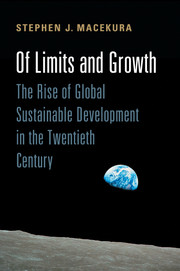Book contents
- Frontmatter
- Contents
- List of Illustrations
- Acknowledgments
- Introduction: NGOs and the Origins of “Sustainable Development”
- PART ONE ORIGINS
- PART TWO REFORMS
- 4 When Small Seemed Beautiful: NGOs, Appropriate Technology, and International Development in the 1970s
- 5 Leveraging the Lenders: The Quest for Environmental Impact Statements in the United States and the World Bank
- 6 Conservation for Development: The World Conservation Strategy and the Rise of Sustainable Development Planning
- PART THREE PERSISTENT PROBLEMS
- Conclusion: The Growth and Limits of NGOs
- Archives
- Index
4 - When Small Seemed Beautiful: NGOs, Appropriate Technology, and International Development in the 1970s
from PART TWO - REFORMS
Published online by Cambridge University Press: 05 July 2015
- Frontmatter
- Contents
- List of Illustrations
- Acknowledgments
- Introduction: NGOs and the Origins of “Sustainable Development”
- PART ONE ORIGINS
- PART TWO REFORMS
- 4 When Small Seemed Beautiful: NGOs, Appropriate Technology, and International Development in the 1970s
- 5 Leveraging the Lenders: The Quest for Environmental Impact Statements in the United States and the World Bank
- 6 Conservation for Development: The World Conservation Strategy and the Rise of Sustainable Development Planning
- PART THREE PERSISTENT PROBLEMS
- Conclusion: The Growth and Limits of NGOs
- Archives
- Index
Summary
In 1973, a year after the Stockholm Conference, an influential and widely read book appeared in bookstores, the hands of youthful protestors, and the libraries of many environmentalists and development reformers. Small Is Beautiful, written by the economist Ernst Friedrich Schumacher, was a collection of essays that advocated for the decentralization of political power, participatory development planning, and economic localism. Schumacher had been born and raised in Germany, but worked professionally in the United Kingdom and as a consultant to multiple postcolonial nations in the 1940s, 1950s, and 1960s. His time in developing countries convinced him that mainstream development strategies – those that had prized rapid industrialization, vast engineering projects, and topdown decision making – were responsible for generating ecological devastation and social dislocation. He believed large-scale national development planning had sparked the many global problems Stockholm Conference attendees had identified. Over the 1960s and early 1970s, Schumacher argued in many forums that emphasizing local production for local needs should be the primary purpose of development and that redressing the overlapping environmental and social crises required a transition away from ambitious development schemes toward local empowerment. Small Is Beautiful presented Schumacher's peculiar strand of heterodox economic thinking for a wide audience. Published in the same year as the first global oil crisis, in the wake of the alarmist Limits to Growth, and amid a growing environmental movement that had proclaimed a global ecological crisis was underway, the book resonated with many readers.
Although reformers of all stripes found the book compelling, Schumacher's work especially captivated the environmental community. It harmonized with a major theme in environmentalists' critique of international development, one that centered on the use of technology in developing countries. As they endeavored to reconcile development with environmental concerns, many environmental activists focused on the role of technology in the development process. In postwar development planning and policies, many development experts believed that the application of advanced industrial technologies to the developing world would spark economic growth. However, by the 1960s and 1970s, many environmentalists assailed development models that relied on such technology.Much like E. F. Schumacher, environmentalists pointed to the many largescale, centralized technological projects – such as major dams, large irrigation systems, and vast electricity grids – that often led to environmental degradation, reduction of natural resource stocks, and social alienation.
- Type
- Chapter
- Information
- Of Limits and GrowthThe Rise of Global Sustainable Development in the Twentieth Century, pp. 137 - 171Publisher: Cambridge University PressPrint publication year: 2015

